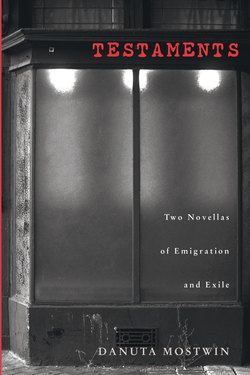Читать книгу Testaments - Danuta Mostwin - Страница 8
На сайте Литреса книга снята с продажи.
ОглавлениеSeries Editor’s Preface
THE IMMIGRANT AGED, “the last of the first” as they have been called, experienced remarkable changes and transformations, both societal and personal, as they left or were expelled from the lands of their birth and started new lives for themselves abroad in places like America. Walls of language and privacy often stood between them and their grandchildren, barring them from telling their often poignant stories until death silenced their lips forever. But these elderly immigrants lived lives of hope and hurt, joy and sorrow, aspiration and resignation, lives worth remembering and recording. In Testaments: Two Novellas of Emigration and Exile, Danuta Mostwin recovers two such bittersweet stories of yesterday’s disappointments and tomorrow’s dreams.
Herself a World War II–era émigré, Danuta Mostwin is both an accomplished scholar and a well-published novelist whose fiction hitherto has remained untranslated, known almost exclusively to Polish-language readers in the United States and in her native Poland. The English translations of the two novellas presented here, Jocasta and The Last Will of Blaise Twardowski, represent the first complete works made accessible to the English-speaking public. Those who venture within the covers of this slim volume will be both touched and taught. Readers never again will see the old immigrant man or the elderly émigré woman the same way they may have seen them—or just looked past them—before encountering the memorable characters in Danuta Mostwin’s two stories. Scholars, students, and general readers will find themselves changed by this book.
Testaments: Two Novellas of Emigration and Exile is the sixth volume in the Ohio University Press Polish and Polish-American Studies Series. The series revisits the historical and contemporary experience of one of America’s largest European ethnic groups and the history of a European homeland that has played a disproportionately important role in twentieth-century and contemporary world affairs. The series aims to publish innovative monographs and more general works that investigate under- or unexplored topics or themes that offer new, critical, revisionist, or comparative perspectives in the area of Polish and Polish-American studies. Interdisciplinary or multidisciplinary in profile, the series seeks manuscripts on Polish immigration and ethnic communities, the country of origin, and its various peoples in history, anthropology, cultural studies, political economy, current politics, and related fields.
Publication of the Ohio University Press Polish and Polish-American Studies Series marks a milestone in the maturation of the Polish studies field and stands as a fitting tribute to the scholars and organizations whose efforts have brought it to fruition. Supported by a series advisory board of accomplished Polonists and Polish-Americanists, the Polish and Polish-American Studies Series has been made possible through generous financial assistance from the Polish American Historical Association, the Polish Institute of Arts and Sciences of America, the Stanislaus A. Blejwas Endowed Chair in Polish and Polish American Studies at Central Connecticut State University, Madonna University, and the Piast Institute and through institutional support from Wayne State University and Ohio University Press. Among the individuals who have helped bring this work into print, our special thanks go to Professor John Kromkowski of the Catholic University of America in Washington, D.C., who, unsolicited, first brought the translations of Danuta Mostwin’s work to our attention, and to Professor Joanna Rostropowicz Clark and Professor Thomas J. Napierkowski, who lent the project their expertise by writing, respectively, an introduction and an afterword for the book. The series meanwhile has benefited from the warm encouragement of a number of other persons, including Gillian Berchowitz, M. B. B. Biskupski, the late Stanislaus A. Blejwas, Mary Erdmans, Thaddeus Gromada, Sister Rose Marie Kujawa, CSSF, James S. Pula, Thaddeus Radzilowski, and David Sanders. The moral and material support from all of these institutions and individuals is gratefully acknowledged.
John J. Bukowczyk
